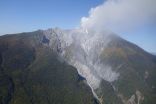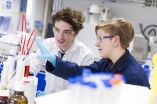INFORMATION:
Trade liberalization reduces countries' defense spending
2015-08-19
(Press-News.org) Reducing trade barriers between countries reduces the likelihood of armed conflict and leads to a reduction in defence spending. In turn, this promotes a domino effect in relation to other countries, which has a positive effect on the situation in the world as a whole. This is the conclusion reached by Roman Zakharenko, Assistant Professor of the HSE International College of Economics and Finance, and his colleagues regarding the relationship between trade and defence spending.
In today's word, armed conflicts are not as frequent as they used to be, but defence spending remains high. 'Our idea was to explore the relationship between trade and defence spending and to show how reducing trade costs (barriers) between two countries affects defence spending', explains Zakharenko.
To examine the relationship between trade and defence spending, the researchers selected pairs of countries in a state of conflict over a significant period of history. To do this, the authors analyzed the history of relations between several countries from the 1950s to the early 1990s. 'Taking the United States and Canada, for example, was pointless, because they have never been in conflict', said Roman Zakharenko. Attention was focused on three pairs of countries: Israel and Jordan, North Korea and South Korea, and Russia and the United States.
Statistical analysis clearly showed how increased trade volumes affects defence spending. 'For example, if Israel and Jordan reduce trade costs so that the volume of trade increases by one dollar, defence spending in the world as a whole is reduced by 10 cents', said Zakharenko. The main volume of the reduction comes from countries participating trade relations - in this case, the total decrease in defence spending of Israel and Jordan is eight cents. The remaining two cents as a result of the so-called domino effect come from other countries associated with the feuding pair - the United States, Egypt, and Saudi Arabia.
The analysis thus suggests that reducing trade barriers can lead to a substantial reduction in defence spending. 'Every additional billion dollars traded between Russia and the United States leads to a reduction in defence spending in the world of 115 million dollars' says Zakharenko.
The research results are particularly relevant in terms of the existing sanctions war between Russia and the West. It is clear that trade barriers have increased - a consequence of the deteriorating political climate. However, an alternative policy leading to the reduction of trade barriers could contribute to the resolution of existing conflicts. 'Sanctions could have been even worse had Russia not entered the WTO. Incidentally, Georgian wines returned at the same time as WTO entry. It's possible that there would have been no sanctions at all had Russia joined the trade organization 10 years earlier', says Zakharenko. Thus, participation in international organizations and development of transport infrastructure, among other things, contributes to reducing political tensions.
In the course of the study, the researchers used publicly available information on all countries around the world, including the Correlates of War (USA) and the Stockholm International Peace Research Institute databases. Existing data on trade and defence spending from 1993 to 2001 were used to study relations directly. The study has been published in the Journal of International Economics by the Elsevier publishing house.
ELSE PRESS RELEASES FROM THIS DATE:
Warning to DIY enthusiasts & construction workers as dangerous dust emissions
2015-08-19
Scientists at the University of Surrey found peak concentrations of potentially harmful ultrafine particles reach up to 4000 times local background levels when undertaking building activities such as drilling. Breathing of these particles is linked with serious cardiovascular and respiratory system related diseases, with ultrafine particles penetrating deeper into the lungs.
The researchers also found that the greatest ultrafine particle emissions occurred during wall chasing (cutting grooves into a wall using an electrical tool, for example to lay electrical cables). ...
Better-tasting grocery store tomatoes could soon be on their way
2015-08-19
BOSTON, Aug. 19, 2015 -- Tomato lovers rejoice: Adding or rearranging a few simple steps in commercial processing could dramatically improve the flavor of this popular fruit sold in the grocery store, according to researchers.
The scientists will present new research on flavor-saving methods at the 250th National Meeting & Exposition of the American Chemical Society (ACS), the world's largest scientific society. The meeting features more than 9,000 reports on new advances in science and other topics. It is being held here through Thursday.
"Ideally, tomatoes should ...
Change in process of disinfecting spinach, salad greens could reduce illness outbreaks
2015-08-19
BOSTON, Aug.19, 2015 -- Cross contamination in commercial processing facilities that prepare spinach and other leafy greens for the market can make people sick. But researchers are reporting a new, easy-to-implement method that could eliminate or reduce such incidences.
The scientists will present their work at the 250th National Meeting & Exposition of the American Chemical Society (ACS), the world's largest scientific society. The meeting features more than 9,000 reports on new advances in science and other topics. It is being held here through Thursday.
Each year ...
New compounds could reduce alcoholics' impulse to drink
2015-08-19
BOSTON, Aug. 19, 2015 -- Alcoholism inflicts a heavy physical, emotional and financial toll on individuals and society. Now new discoveries and promising animal studies are offering a glimmer of hope that a new class of drugs could treat the disease without many of the unwanted side effects caused by current therapies.
Researchers are presenting the results of their work today at the 250th National Meeting & Exposition of the American Chemical Society (ACS), the world's largest scientific society. The meeting features more than 9,000 presentations on a wide range of science ...
Helium anomaly preceded Mount Ontake eruption
2015-08-19
University of Tokyo researchers discovered an increase in a helium isotope during a ten-year period before the 2014 Mount Ontake eruption in central Japan. The finding suggests that this helium isotope anomaly is related to activation of the volcano's magma system and could be a valuable marker for long-term risk mitigation concerning volcanic eruption.
Small quantities of the isotope helium-3 are present in the mantle, while helium-4 is produced in the crust and mantle by radioactive decay. A higher ratio of helium-3 to helium-4 therefore indicates that a sample of helium ...
The global cost of unsafe abortion
2015-08-19
Seven million women a year in the developing world are treated in healthcare facilities for complications following unsafe abortion, finds a study published today (19 August) in BJOG: An International Journal of Obstetrics & Gynaecology (BJOG).
Every day, approximately 800 women die from preventable causes related to pregnancy and childbirth. Unsafe abortion accounts for 8 - 15% of maternal deaths and remains one of the leading causes of maternal mortality worldwide.[1] However, these figures do not take into account the number of women who are surviving but need hospital ...
How UEA research could help build computers from DNA
2015-08-19
New research from the University of East Anglia could one day help build computers from DNA.
Scientists have found a way to 'switch' the structure of DNA using copper salts and EDTA (Ethylenediaminetetraacetic acid) - an agent commonly found in shampoo and other household products.
It was previously known that the structure of a piece of DNA could be changed using acid, which causes it to fold up into what is known as an 'i-motif'.
But new research published today in the journal Chemical Communications reveals that the structure can be switched a second time into ...
Nine-gene MPI can provide accurate survival stratification in patients with NSCLC
2015-08-18
A nine-gene molecular prognostic index (MPI) for patients with early-stage non-small cell lung cancer (NSCLC) was able to provide accurate survival stratification and could potentially inform the use of adjuvant therapy in patients struggling with the disease, according to a study published August 18 in the JNCI: Journal of the National Cancer Institute.
Non-small cell lung cancer (NSCLC) accounts for roughly 85% of all lung cancers, additionally; lung cancer is the leading cause of cancer death through out the world. While gene expression profiles have been shown to ...
Reports on US geoscience education published by AGI's Center for Geoscience & Society
2015-08-18
Alexandria, VA - The American Geosciences Institute's Center for Geoscience and Society is pleased to release two reports concerning geosciences education in the United States. The reports were developed in response to the need for comprehensive monitoring of the U.S. educational system in terms of the instruction of geoscience content and participation in geoscience-related learning experiences. The reports are based on data pertaining to science education collected from all 50 states and the District of Columbia.
The "Report on the Status of K-5 Geosciences Education ...
Scientist: Most complete human brain model to date is a 'brain changer'
2015-08-18
COLUMBUS, Ohio - Scientists at The Ohio State University have developed a nearly complete human brain in a dish that equals the brain maturity of a five-week-old fetus.
The brain organoid, engineered from adult human skin cells, is the most complete human brain model yet developed, said Rene Anand, professor of biological chemistry and pharmacology at Ohio State.
The lab-grown brain, about the size of a pencil eraser, has an identifiable structure and contains 99 percent of the genes present in the human fetal brain. Such a system will enable ethical and more rapid ...

